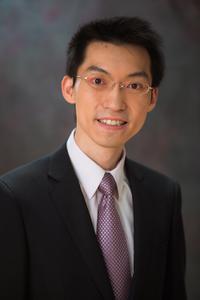ESP Biography
KUN-HSING YU, Stanford Biomedical Informatics PhD Candidate
|
Major: Biomedical Informatics College/Employer: Stanford Year of Graduation: 2016 |

|
Brief Biographical Sketch:
I am a PhD candidate in Stanford Biomedical Informatics Program. Prior to joining Stanford, I was a physician at National Taiwan University Hospital. I witnessed that there were still a lot of diseases without definite cure, in spite of recent advancements in medicine. I believe it is more fun and exciting to improve current treatments through continuous research, so I came here for further studies. My current research interest includes biomarker discovery, machine learning, natural language processing, and translational bioinformatics. Past Classes(Clicking a class title will bring you to the course's section of the corresponding course catalog)B4769: How to Distinguish Medical Knowledge from Hoaxes? in Splash Spring 2016 (Apr. 09 - 10, 2016)
There are lots of newspaper articles talking about the "recent advances in health sciences". Some suggest "beer helps to prevent cancer", others assert "beer increased risks of getting cancer". Which one should we believe?
How do doctors decide what to do when coming across contrary scientific evidences? And what doctors don't know about the surgery they perform or the drugs they prescribe?
We will do some hands-on experiments on drawing conclusions in the world of uncertainty, and take a quick survey of current methodologies in medical sciences.
B4457: How to Distinguish Medical Knowledge from Hoaxes? in Splash Fall 2015 (Nov. 07 - 08, 2015)
There are lots of newspaper articles talking about the "recent advances in health sciences". Some suggest "beer helps to prevent cancer", others assert "beer increased risks of getting cancer". Which one should we believe?
How do doctors decide what to do when coming across contrary scientific evidences? And what doctors don't know about the surgery they perform or the drugs they prescribe?
We will do some hands-on experiments on drawing conclusions in the world of uncertainty, and take a quick survey of current methodologies in medical sciences.
B4091: How to Distinguish Medical Knowledge from Hoaxes? in Splash Spring 2015 (Apr. 11 - 12, 2015)
There are lots of newspaper articles talking about the "recent advances in health sciences". Some suggest "beer helps to prevent cancer", others assert "beer increased risks of getting cancer". Which one should we believe?
How do doctors decide what to do when coming across contrary scientific evidences? And what doctors don't know about the surgery they perform or the drugs they prescribe?
We will do some hands-on experiments on drawing conclusions in the world of uncertainty, and take a quick survey of current methodologies in medical sciences.
B3753: How to Distinguish Medical Knowledge from Hoaxes? in Splash Fall 2014 (Nov. 08 - 09, 2014)
There are lots of newspaper articles talking about the "recent advances in health sciences". Some suggest "beer helps to prevent cancer", others assert "beer increased risks of getting cancer". Which one should we believe?
How do doctors decide what to do when coming across contrary scientific evidences? And what doctors don't know about the surgery they perform or the drugs they prescribe?
We will do some hands-on experiments on drawing conclusions in the world of uncertainty, and take a quick survey of current methodologies in medical sciences.
B3363: How to Distinguish Medical Knowledge from Hoaxes? in Splash! Spring 2014 (Apr. 12 - 13, 2014)
There are lots of newspaper articles talking about the "recent advances in health sciences". Some suggest "beer helps to prevent cancer", others assert "beer increased risks of getting cancer". Which one should we believe?
How do doctors decide what to do when coming across contrary scientific evidences? And what doctors don't know about the surgery they perform or the drugs they prescribe?
We will do some hands-on experiments on drawing conclusions in the world of uncertainty, and take a quick survey of current methodologies in medical sciences.
B3068: How to Distinguish Medical Knowledge from Hoaxes? in Splash! Fall 2013 (Nov. 02 - 03, 2013)
There are lots of newspaper articles talking about the “recent advances in health sciences”. Some suggest that “beer helps to prevent cancer”, others assert “beer increases risks of getting cancer”. Which one should we believe?
How do doctors decide what to do when coming across contrary scientific evidences? And what doctors don’t know about the surgery they perform or the drugs they prescribe?
We will do some hands-on experiments on drawing conclusions in the world of uncertainty, and take a quick survey of current methodologies in medical sciences.
B2728: How to Distinguish Medical Knowledge from Hoaxes? in Splash! Spring 2013 (Apr. 13 - 14, 2013)
There are lots of newspaper articles talking about the "recent advances in health sciences". Some suggest that "beer helps to prevent cancer", others assert "beer increases risks of getting cancer". Which one should we believe?
How do doctors decide what to do when coming across contrary scientific evidences? And what doctors don't know about the surgery they perform or the drugs they prescribe?
We will do some hands-on experiments on drawing conclusions in the world of uncertainty, and take a quick survey of current methodologies in medical sciences.
|
|
